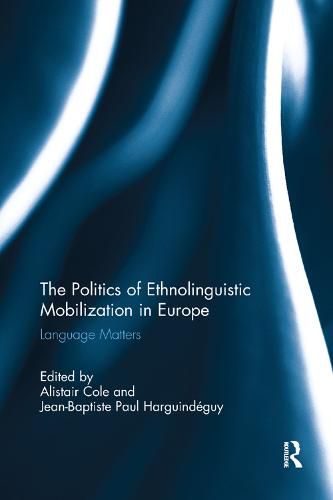Readings Newsletter
Become a Readings Member to make your shopping experience even easier.
Sign in or sign up for free!
You’re not far away from qualifying for FREE standard shipping within Australia
You’ve qualified for FREE standard shipping within Australia
The cart is loading…






Language constitutes a very sensitive nexus between the concepts of territory and community. Though a fundamental issue in contemporary societies, it remains relatively unaddressed by political scientists. This book promotes a better understanding of the connection between the concepts of identity, territory and language in the context of an enlarged Europe. We propose a portrait of the actual place of regional languages in European politics. Ethno-linguistic mobilisations have occurred in very different contexts, and their interpretation needs to take into account varying configurations and conditions of success that we label as situational, institutional, and socio-political. The book combines empirical case studies drawn from Spain, the UK, Poland, France, Ireland and Canada with comparative, conceptual and theoretical insights into linguistic uniformity and diversity. The various chapters in the book go beyond description. The originality of the work is to bridge the institutionalisation of language regimes, the sociological analysis of languages rights’ movements, and the normative underpinnings that ought to underpin language claims.
This book was published as a special issue of Regional and Federal Studies.
$9.00 standard shipping within Australia
FREE standard shipping within Australia for orders over $100.00
Express & International shipping calculated at checkout
Language constitutes a very sensitive nexus between the concepts of territory and community. Though a fundamental issue in contemporary societies, it remains relatively unaddressed by political scientists. This book promotes a better understanding of the connection between the concepts of identity, territory and language in the context of an enlarged Europe. We propose a portrait of the actual place of regional languages in European politics. Ethno-linguistic mobilisations have occurred in very different contexts, and their interpretation needs to take into account varying configurations and conditions of success that we label as situational, institutional, and socio-political. The book combines empirical case studies drawn from Spain, the UK, Poland, France, Ireland and Canada with comparative, conceptual and theoretical insights into linguistic uniformity and diversity. The various chapters in the book go beyond description. The originality of the work is to bridge the institutionalisation of language regimes, the sociological analysis of languages rights’ movements, and the normative underpinnings that ought to underpin language claims.
This book was published as a special issue of Regional and Federal Studies.